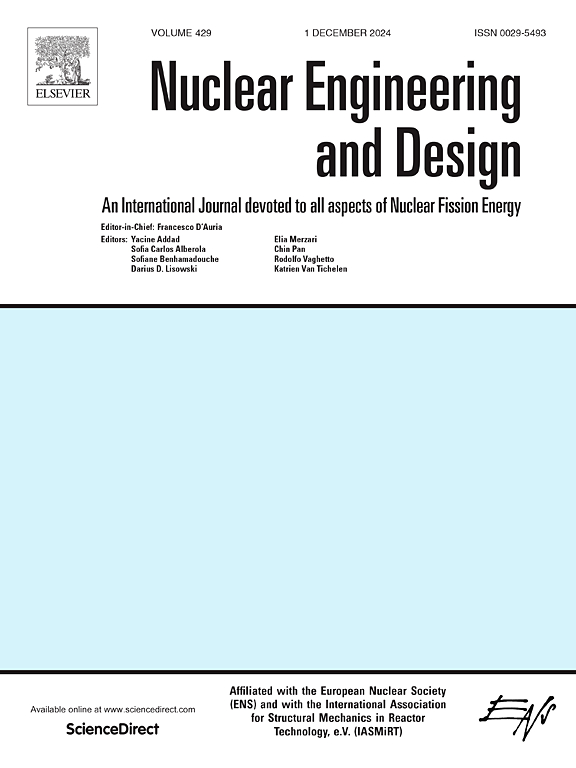Optimization of the route of the refueling machine to reduce the refueling time: Case study of the BN-800 reactor
IF 1.9
3区 工程技术
Q1 NUCLEAR SCIENCE & TECHNOLOGY
引用次数: 0
Abstract
Sodium-cooled fast reactors (SFR) are included in the list of fourth-generation nuclear energy systems, the so-called generation IV (GEN-IV). It is the only technology of GEN-IV that possesses the significant practical experience of design, construction, and operation of high-power reactors. Due to the high temperature of the coolant at the BN-600 and BN-800 reactor core outlets, the steam generator produces steam with higher enthalpy, and this significantly increases the efficiency of cogeneration at SFR power plants in comparison with pressured water reactor (PWR) or boiling water reactor (BWR) units. The primary nuclear fuel effectiveness rises due to cogeneration with higher efficiency of a sodium-cooled fast reactor nuclear power plant (NPP) in comparison with thermal reactors. In addition, it is necessary to reduce the reactor refueling outages to improve the nuclear power plant utilization factor.
It is possible to reduce the duration of the reactor refueling by the route optimization of the refueling machine movement. The prevailing in the world thermal neutron reactors with water cooling have a refueling machine that points the certain fuel assembly using two coordinates. The fast neutron reactors use sodium as a coolant; thus, there is a problem with its violent reaction with water and air oxygen. Therefore, it is necessary to exclude the contact of sodium and surrounding air during the refueling. To achieve this, the system of refueling machine pointing is used, consisting of two or three eccentrically located rotating plugs with hydraulic locks. The article presents the results of the creation of mathematical models of refueling machine movement and fuel assembly gripping. The time-optimal algorithms for the operation of refueling machines with three rotating plugs are proposed. The use of the new algorithm allows to reduce the time of movement of the grip of the refueling machine by 30–37%.
优化加油机路线,缩短加油时间:BN-800 反应堆案例研究
钠冷快堆被列入第四代核能系统,即所谓的第四代核能系统(GEN-IV)。它是第四代核能系统中唯一拥有设计、建造和运行大功率反应堆丰富实践经验的技术。由于 BN-600 和 BN-800 反应堆堆芯出口的冷却剂温度较高,蒸汽发生器产生的蒸汽焓值较高,与压水堆(PWR)或沸水堆(BWR)机组相比,这大大提高了 SFR 电站的热电联产效率。与热反应堆相比,钠冷快堆核电站(NPP)的热电联产效率更高,一次核燃料效率也随之提高。此外,有必要减少反应堆换料的中断时间,以提高核电站的利用率。世界上普遍使用的水冷热中子反应堆的换料机通过两个坐标指向特定的燃料组件。快中子反应堆使用钠作为冷却剂,因此存在钠与水和空气中的氧气发生剧烈反应的问题。因此,在加油过程中必须避免钠与周围空气接触。为实现这一目标,使用了由两个或三个带液压锁的偏心旋转塞组成的加油机点火系统。文章介绍了创建加油机运动和燃料组件抓取数学模型的结果。文章提出了带有三个旋转塞的加油机运行的时间最优算法。使用新算法可以将加油机夹具的移动时间缩短 30-37%。
本文章由计算机程序翻译,如有差异,请以英文原文为准。
求助全文
约1分钟内获得全文
求助全文
来源期刊

Nuclear Engineering and Design
工程技术-核科学技术
CiteScore
3.40
自引率
11.80%
发文量
377
审稿时长
5 months
期刊介绍:
Nuclear Engineering and Design covers the wide range of disciplines involved in the engineering, design, safety and construction of nuclear fission reactors. The Editors welcome papers both on applied and innovative aspects and developments in nuclear science and technology.
Fundamentals of Reactor Design include:
• Thermal-Hydraulics and Core Physics
• Safety Analysis, Risk Assessment (PSA)
• Structural and Mechanical Engineering
• Materials Science
• Fuel Behavior and Design
• Structural Plant Design
• Engineering of Reactor Components
• Experiments
Aspects beyond fundamentals of Reactor Design covered:
• Accident Mitigation Measures
• Reactor Control Systems
• Licensing Issues
• Safeguard Engineering
• Economy of Plants
• Reprocessing / Waste Disposal
• Applications of Nuclear Energy
• Maintenance
• Decommissioning
Papers on new reactor ideas and developments (Generation IV reactors) such as inherently safe modular HTRs, High Performance LWRs/HWRs and LMFBs/GFR will be considered; Actinide Burners, Accelerator Driven Systems, Energy Amplifiers and other special designs of power and research reactors and their applications are also encouraged.
 求助内容:
求助内容: 应助结果提醒方式:
应助结果提醒方式:


